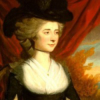Fanny Burney

Fanny Burney
Frances Burney, also known as Fanny Burney and after her marriage as Madame d'Arblay, was an English novelist, diarist and playwright. She was born in Lynn Regis, now King's Lynn, England, on 13 June 1752, to musical historian Dr. Charles Burneyand Esther Sleepe Burney. The third of six children, she was self-educated and began writing what she called her "scribblings" at the age of ten. In 1793, aged 41, she married a French exile, General Alexandre D'Arblay. Their only son,...
NationalityEnglish
ProfessionNovelist
Date of Birth13 June 1752
Imagination took the reins, and reason, slow-paced, though sure-footed, was unequal to a race with so eccentric and flighty a companion.
I never pretend to be so superior a being as to be above having and indulging a hobby horse [her journal writing], and while I keep mine within due bounds and limits, nobody, I flatter myself, would wish to deprive me of the poor animal: to be sure, he is not formed for labour, and is rather lame and weak, but then the dear creature is faithful, constant, and loving, and though he sometimes prances, would not kick anyone into the mire, or hurt a single soul for the world--and I would not part with him for one who could win the greatest prize that ever was won at any races.
I love and honour [Paulus Aemilius, in Plutarch's Lives], for his fondness for his children, which instead of blushing at, he avows and glories in: and that at an age, when almost all the heros and great men thought that to make their children and family a secondary concern, was the first proof of their superiority and greatness of soul.
The laws of custom make our [returning a visit] necessary. O how I hate this vile custom which obliges us to make slaves of ourselves! to sell the most precious property we boast, our time;--and to sacrifice it to every prattling impertinent who chooses to demand it!
Nothing is so delicate as the reputation of a woman; it is at once the most beautiful and most brittle of all human things.
Money is the source of the greatest vice, and that nation which is most rich, is most wicked.
. . . men seldom risk their lives where an escape is without hope of recompense.
Those who wander in the world avowedly and purposely in pursuit of happiness, who view every scene of present joy with an eye to what may succeed, certainly are more liable to disappointment, misfortune and unhappiness, than those who give up their fate to chance and take the goods and evils of fortune as they come, without making happiness their study, or misery their foresight.
In England, I was quite struck to see how forward the girls are made--a child of 10 years old, will chat and keep you company, while her parents are busy or out etc.--with the ease of a woman of 26. But then, how does this education go on?--Not at all: it absolutely stops short.
You have sensible women here [in England] but then, they are very devils--censorious, uncharitable, sarcastic--the women in Scotland have twice--thrice their freedom, with all their virtue--and are very conversable and agreeable--their educations are more finished.
I have this very moment finished reading a novel called The Vicar of Wakefield [by Oliver Goldsmith].... It appears to me, to be impossible any person could read this book through with a dry eye and yet, I don't much like it.... There is but very little story, the plot is thin, the incidents very rare, the sentiments uncommon, the vicar is contented, humble, pious, virtuous--but upon the whole the book has not at all satisfied my expectations.
When young people are too rigidly sequestered from [the world], their lively and romantic imaginations paint it to them as a paradise of which they have been beguiled; but when they are shown it properly, and in due time, they see it such as it really is, equally shared by pain and pleasure, hope and disappointment.
To despise riches, may, indeed, be philosophic, but to dispense them worthily, must surely be more beneficial to mankind.
Never shall I recollect the occasion he gave me of displeasure, without feeling it renewed.